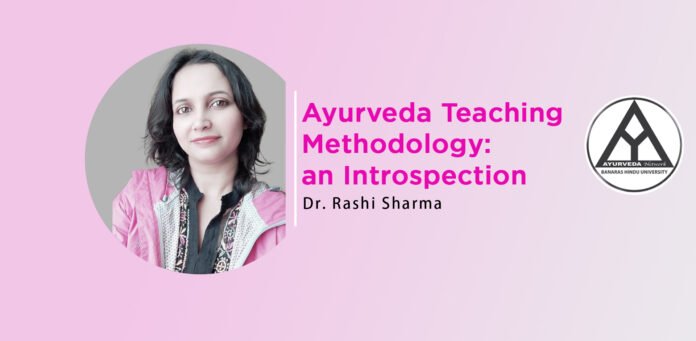Ayurveda teaching methodology and introspection
Dr. Rashi Sharma
Associate Professor, Dept of Kriya Sharir
Faculty of Ayurveda, IMS, BHU
based on the lecture available at
Ayurveda teaching methodology and introspection
It is a fact that if you worry about becoming a good teacher, it means that you are already one. What are the qualities of a teacher that we remember about our favourite teachers and the reasons for which they are still remembered?
Qualities of a Memorable Teacher:
- Enthusiasm
- Punctuality
- Consistency
- Politeness
- Knowledge
- Communicability
- Connection with students
- Sense of humour
Teachers who are remembered for the wrong reasons may exhibit over-discipline, lack of communication skills, a disconnect with students, and a lack of punctuality. There are right and wrong reasons for remembrance, so one should decide what they want to be remembered for.
Why one becomes a teacher? It may be for earning, earning respect, attaining a position, or due to some compulsion, to ignite young minds. One can be a good teacher only when one wants to make the lives of others better. Encourage students to find opportunities in criticism
Tips for Effective Teaching:
- Thorough knowledge of the subject
- Stay updated and evolve regularly
- Understand the needs of students
- Allow and listen to students
- Be patient
- Emphasize presentation skills
- Focus on application of subjects in real life
- Pay attention to all students, not just the high achievers
- Inspire students to ask questions
Presentation skills are crucial; good teaching is one-third knowledge, and two-thirds is how to present it. Use soft skills such as punctuation, voice modulation, pauses, eye contact, and connection. Don’t just focus on passing examinations; concentrate on how a particular subject can be applied in the real lives of students. Don’t focus on good students alone; also pay attention to troublesome individuals. Inspire students to ask questions. A teacher should ask a minimum of 10% of questions to students; instead, they should inspire students to ask a maximum of questions themselves. The only true wisdom is in knowing that you know nothing. Sincere and intelligent doubt from students increases the wisdom of the teacher. A good teacher explains, while a great one inspires. The greatest enemy of knowledge is not ignorance but the illusion of knowledge. Let’s expand beyond teaching; do not focus just on finishing the curriculum but see each student as a stakeholder in the future. Look at the potential of each and every one and help them to groom it. Help students overcome their bad days and failures, inspiring them to learn from their mistakes. Teach them to find opportunities in criticism.
Also, remain available after class. Some students are not comfortable asking questions in class. Some are late risers and may not quickly understand what has been going on in the lecture. Some may have queries later, after some deep thinking or further studies.
How do we teach?
We should use a variety of teaching approaches, both offline and online in the present scenario of COVID-19. Maintain eye contact with students and utilize participatory teaching methods such as question-and-answer sessions, discussions, brainstorming exercises, role-playing, interactive materials, quizzes, case studies, field visits, and debates.
There is no single teaching method suitable for all students. All these methods should be used interchangeably. Teaching is about motivating students to learn in a manner that is easily memorable, meaningful, and relevant. Good teaching bridges the gap between theoretical and practical aspects of the subject. Being a teacher is wonderful because it provides the freedom to choose directions, rediscover oneself throughout the career, be part of international research communities, travel, and have a useful job with a good social life. It offers a huge domain of success and a flexible schedule with a sense of satisfaction. Always inspire students to lead, take on challenges, find solutions, appreciate the efforts of others, and be part of collective wisdom.
Some challenges for students in Ayurveda include the difficulty of Sanskrit. When science students enter Ayurveda, the most challenging aspect is Sanskrit, as it is a new subject to understand. Most ancient Ayurvedic literature is in Sanskrit, creating difficulties for students. Lack of knowledge in Sanskrit leads to wrong interpretations of ancient manuscripts, hampering their immediate practical applications. Resources are scattered, information is coded in sutra form, and there is a gap between expectations and reality. This leads to a lack of interest in Ayurveda and demotivates students. Inadequate knowledge resources and a lack of specialized teaching training programs for aspiring teachers contribute to the challenges faced by Ayurvedic graduates. Ancient teaching methodologies are mentioned in different Samhitas.
Take-home message:
Selecting teaching as a profession and becoming a real teacher are entirely different. Knowledge cannot be shared unless one really feels it. Being a real teacher requires self-motivation and discipline. Always be a researcher, and the mind of every teacher should be a laboratory. If we assign numbers to each alphabet (A=1, B=2, etc.) and calculate skills, it comes to 82%. For knowledge, it’s 96%, for hard work, it’s 98%, and for attitude, it’s 100%.


